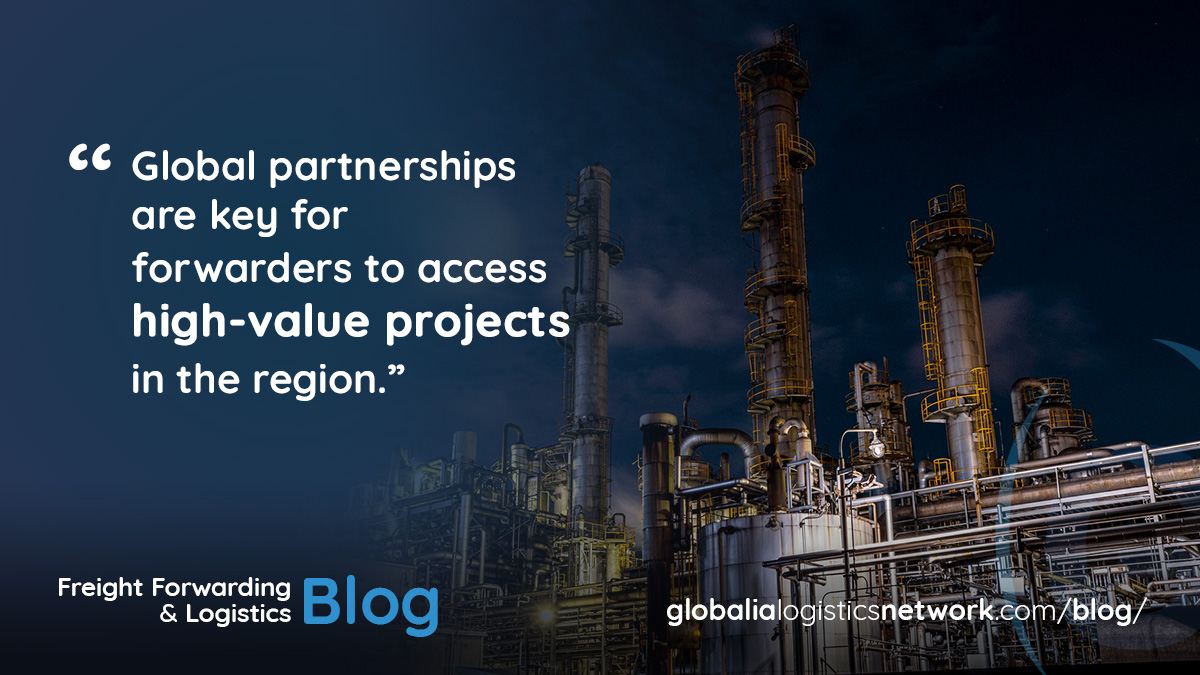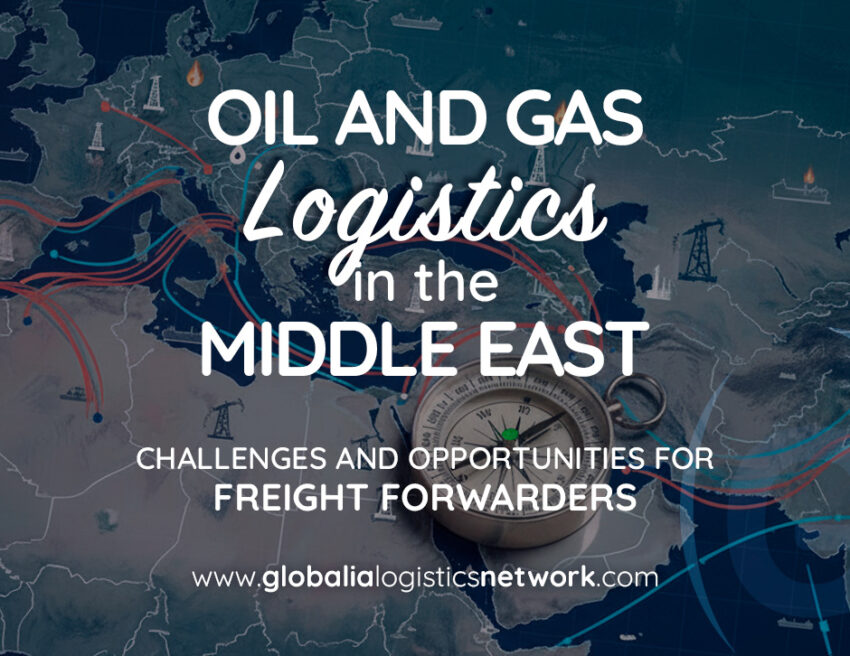The Middle East is at the heart of the global oil and gas industry, supplying a significant portion of the world’s energy needs. For freight forwarders operating in the region, this presents immense opportunities, but it also comes with a complex set of challenges. From navigating geopolitical risks and regulatory hurdles to handling complex shipments and project cargo, forwarders need specialized knowledge, strategic planning, and strong networks to thrive. This blog explores the current landscape of oil and gas logistics in the Middle East, the pain points freight forwarders face, and the emerging opportunities that can help them grow and strengthen their business.

Navigating geopolitical and regulatory challenges
One of the biggest challenges freight forwarders in the Middle East face is the region’s geopolitical landscape. Tensions between countries, ongoing conflicts, and security concerns in critical shipping routes like the Strait of Hormuz can disrupt supply chains at a moment’s notice. These disruptions affect transit times, insurance costs, and even freight rates. Forwarders must constantly monitor the political climate and adapt their strategies to ensure shipments reach their destinations safely and on time.
Trade regulations and tariffs also add a layer of complexity. While some countries in the Gulf Cooperation Council (GCC) maintain relatively liberal trade policies, others impose strict customs requirements or sanctions. Freight forwarders must ensure full compliance with these rules, which often change rapidly, to avoid fines or shipment delays.
Another key regulatory challenge is environmental compliance. As global attention on sustainability grows, forwarders must adopt greener practices in their operations. For the oil and gas logistics sector, this includes monitoring emissions, optimizing routes, and incorporating energy-efficient handling and transportation practices.
Operational complexities and infrastructure limitations
Transporting oil and gas products is inherently complex due to the size, weight, and hazardous nature of the cargo. Many shipments involve project cargo, such as turbines, tanks, or other oversized equipment, which require careful planning, specialized equipment, and precise coordination across multiple transport modes, sea, land, and sometimes air.
Ports in the region, like Jebel Ali in the UAE or Ras Tanura in Saudi Arabia, are major hubs but can face congestion, leading to delays. Inland transport is similarly challenging, with some routes affected by limited road or rail infrastructure. Freight forwarders need to account for these factors in their planning to maintain delivery timelines and manage costs effectively.
The coordination of multimodal transport adds another layer of complexity. For example, moving a large oil rig component may involve loading onto a flat-rack vessel, followed by inland trucking with escort vehicles, and final delivery using heavy-lift equipment. Each stage must be meticulously planned, requiring forwarders to anticipate potential bottlenecks and manage risk proactively.
Challenges specific to freight forwarders in the Middle East
Freight forwarders in the region face several recurring pain points:
-
High operating costs: Due to insurance, security, and specialized handling requirements.
-
Limited visibility: Tracking and monitoring shipments in real time can be difficult, especially for multimodal project cargo.
-
Shortage of skilled personnel: Handling oil and gas logistics requires expertise in safety regulations, customs, and specialized transport equipment.
-
Volatile market conditions: Oil price fluctuations can influence shipping demand and contract terms.
Despite these challenges, forwarders who can successfully navigate these hurdles are well-positioned to capture a significant share of the growing logistics market in the Middle East.
Opportunities for growth and strategic advantage
While challenges are real, opportunities in oil and gas logistics are equally significant. The ongoing development of mega-projects, refinery expansions, and oilfield explorations across the GCC and broader Middle East region means a steady demand for freight forwarding services.
Project cargo handling remains a particularly lucrative area. Forwarders who specialize in moving oversized or complex shipments can command premium rates and build long-term relationships with energy companies. Similarly, multimodal logistics solutions combining sea, road, and rail transport efficiently offer forwarders a competitive edge, allowing them to provide end-to-end service for high-value shipments.
Advances in technology also create opportunities. Tools such as real-time tracking systems, digital freight platforms, and predictive analytics allow forwarders to optimize routes, reduce costs, and provide more transparency to clients. For Middle East-based companies, integrating these technologies can strengthen their position in an increasingly competitive market.
Leveraging networks to expand reach
Another avenue for growth is through collaboration and global partnerships. Freight forwarders in the Middle East can benefit significantly by joining reputable international logistics networks like Globalia Logistics Network. Such networks provide access to a vast pool of partners, shared expertise, and business opportunities across borders. Being part of a network not only enhances credibility but also allows forwarders to participate in high-value projects they might not access independently.
Join us to expand your footprint!
Through network membership, forwarders gain insights into global trends, best practices, and emerging markets, essential knowledge for navigating complex oil and gas logistics operations. For companies looking to expand their footprint in the region and beyond, such alliances can translate into tangible business growth.
The future of oil and gas logistics in the Middle East
Looking ahead, oil and gas logistics in the Middle East will continue to evolve, shaped by technology, sustainability mandates, and geopolitical factors. Freight forwarders who embrace innovation, invest in specialized capabilities, and cultivate strong global partnerships will be well-positioned to capitalize on growth opportunities.
Sustainability will be a key differentiator. Forwarders adopting greener practices will not only comply with regulations but also appeal to environmentally conscious clients. Digital transformation, including AI-driven route optimization, automated tracking, and cloud-based documentation, will improve operational efficiency and customer satisfaction.
In addition, forwarders who can offer value-added services such as project planning, risk management, and compliance advisory will become indispensable partners for oil and gas companies. The ability to deliver solutions rather than just transport will be the defining factor for success in the coming years.
Conclusion
Freight forwarders in the Middle East operate in a challenging but highly rewarding environment. Oil and gas logistics demand precision, expertise, and adaptability, with risks ranging from geopolitical tensions to infrastructure limitations and complex regulatory frameworks. Yet, for those who navigate these challenges effectively, the opportunities are immense.
By focusing on specialized services, leveraging technology, and joining an international logistics networks like Globalia, forwarders can enhance their visibility, expand their business, and become trusted partners for oil and gas companies in the region. The future belongs to those who can combine expertise, strategic partnerships, and innovation to deliver reliable, efficient, and sustainable logistics solutions.


